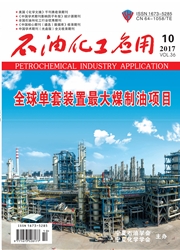

 中文摘要:
中文摘要:
目前国内外对低渗透砂岩储层应力敏感评价通常在常温下进行实验。为评价温度对低渗透砂岩储层应力敏感影响作用,本文以鄂尔多斯盆地低渗透砂岩为对象,在对岩样和皮套进行老化处理后,保持内压5 MPa不变,改变围压,实验测试了三块岩样不同温度、不同有效应力下岩样渗透率的变化。实验结果表明:(1)随有效应力增加,岩样渗透率减小。随着温度增加,岩样渗透率也减小;(2)对于岩样A和岩样B来说,温度在20℃弱应力敏感,而温度升高至40℃、60℃、80℃,岩样变成中等应力敏感。温度对低渗透砂岩储层应力敏感影响不容忽视;(3)对同一块岩样,温度对岩样渗透率的影响低于有效应力对渗透率的影响;(4)对应力敏感系数分析得出,随温度增大应力敏感系数增大,并且应力敏感系数与温度呈线性关系。推导得出渗透率与温度呈线性关系。
 英文摘要:
英文摘要:
Currently, the evaluation for stress sensitivity of low permeability sandstone reservoir is usually carried out at room temperature at home and abroad. To evaluate the temperature influence on the stress sensitivity of low permeability sandstone reservoir, after being aging treated, the experiment test the permeability of the three samples under different temperature and different effective stress by keeping the internal pressure of 5 MPa and changing the confining pressure in the Ordos basin. For sample A and sample B, the permeability of the samples from Ordos basin is experimental measured under different temperatures and effective stresses. The experiment show below results,(1)with the increase of effective stress, the perm eability of three decreases, with the increase of temperature, the permeability also decreases.(2)For sample A and sample B, the temperature gradual increased from 20 ℃ to 40 ℃,60 ℃, 80 ℃, the sample turned weak stress sensitive into secondary stress sensitivity. So the temperature effect on the stress sensitivity of low permeability sandstone reservoir cannot be ignored.(3)On the same sample, the temperature effect on the rock permeability is lower than the effective stress.(4)Through the analysis of stress sensitive coefficient the results shows that stress sensitive coefficient increases along with the temperature increasing, and the stress sensitive coefficient has a linear relation with temperature, there is also a linear relationship between permeability and temperature.
 同期刊论文项目
同期刊论文项目
 同项目期刊论文
同项目期刊论文
 期刊信息
期刊信息
